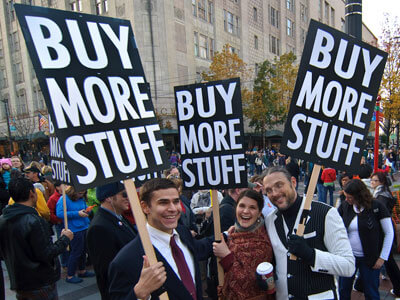5 Powerful Black Friday Hacks to Avoid the Pure Evil Genius of Retailers

What the Black Friday weekend does to people is absolutely insane.
It’s human irrationality at it’s best, and retailers have figured out all of the right buttons to push to make it happen.
I know I’m not going to keep you from buying stuff. There are just too many forces working against you, but what I can try to do is help you be smart and fight back against the evil genius of retailers during this time of year.
Believe me – I wish the answer was as simple as this dude makes it, but it’s at least hilarious to watch 🙂
That tune gets stuck in my head 🙂
As much as we all love one another, the simple fact is that the holiday season is a time of consumerism for the vast majority of people. We’re always going to buy stuff.
Even I fall victim to the evil of retailers to a certain extent (my house has two robot vacuums for crying out loud…), although I’ve learned a few ways to keep it within reason.
Hacks to Avoid the Pure Evil Genius of Retailers
Unfortunately, logic alone will not win this battle for you. You can say you’ll try harder this year, but if it were that easy we would all succeed.
We all know we should save and invest, but we love stuff, and we love to give other people stuff. It’s a golden scenario for retailers.
So on that note, here are a few hacks to help you keep your dollars in check.
Stay home and avoid the frenzy
Physical senses can become very easily overwhelmed when out in the wild, lowering your ability to resist temptations. It’s also extremely easy to fall victim to forces like mob mentality and social proof.
Think about any time you were in a busy public place and a crowd gathered around something. It’s next to impossible not to be at least curious, and is hard wired into our brains to want to know what all the fuss is about.
Apple Retail Stores know this and take advantage of this masterfully. They schedule training sessions, repair appointments, service upgrades, and anything they can do to get bodies in the store during all hours of the day. This makes their locations appear busy at all times and strengthens the perception of their brand and draws even more people to their products.
It’s brilliant, but it’s also pure evil genius – no pun intended.
The same thing happens during massive sales like those that occur on Black Friday weekend. The entire phenomenon is designed around taking advantage of social and psychological triggers just like this.
- Completely manufactured “limited quantity” deals
- Insanely marked down prices used promote cross and up-selling
- Bundled deals designed to increase the perception of value
- Stupid easy credit options that make buying as easy as possible
It’s harder to execute a strategy like this online. The big websites do a pretty good job of providing social signals to convince buyers to take action, but it’s much more difficult for them to influence your behavior when all you have to do is shut your laptop vs. navigate a labyrinth of behavioral triggers on the way out that are designed to get you to buy.
Do yourself a favor and do your shopping online. It’s the easiest way to minimize these environmental triggers that can lead to a mob-mentality-like behavior.
Do your research and stick to a list
I have a fondness for lists. From increasing your productivity to making sure you don’t forget things, to strengthening process control – you can use them for a lot of different things.
Shopping is definitely one of those things. Going into a store without a list, or even shopping exclusively online as I do, especially on Black Friday weekend, is like having a knife in a gunfight. Unless you’re skilled in the consumer equivalent of Krav Maga, you’re probably not going to win against the big box stores.
An incredibly simple hack to help focus your attention is to create a list of what you’re after.
Get specific by doing your research ahead of time. Know exactly what you want down to the brand and even the price. Be disciplined with yourself and get in and out quickly. The more you browse (or surf), the more you tempt your irrationality.
The Penny Hoarder put together a great black Friday portal where you can do your deal research here – http://blackfriday.thepennyhoarder.com/
By doing this, you not only focus your physical attention on finding those items, but you also prepare your subconscious to help you block everything else out.
Don’t let yourself stray. One item turns into two. Two turns into four, and before you know it you’re in debt for the next six months.
Get a prepaid card and set a spending limit (and stick to it)
One of the ways I simplify my life is by operating with a set of principles that guide me.
A great principle that can apply to this situation is this – “If you want to stop yourself from doing something, make it as difficult as possible to do.”
For example:
- Want to lose weight? Make it difficult to eat crappy food by getting rid of all of the junk in your house.
- Want to save more money? Make it difficult to spend by setting up an automatic savings plan and restricting access to your savings.
- Want to work out more? Make it difficult to quit by setting up an accountability system with friends, family, coaches, and stakes.
You can apply the exact same principle to spending by designating a set limit for your Christmas shopping and putting that on a prepaid card.
By knowing that you have to work within the limitations you’ve put on yourself with that card, you’re forced to be smart with your spending.
You’ll still have to use some discipline here not to reload the card or pull out another one, but this is at least another barrier you’ve put up for yourself in your fight against retailer evil.
Understand scarcity mentality, and recognize it when it happens
Scarcity is one of the most powerful drivers of human behavior in existence and it can drive demand through the roof. As the opportunity to get something gets smaller and smaller, we want it more and more.
That girl that plays hard to get. That beer that is only available once a year. That food that is forbidden on your cleanse diet. And well… Groupon…
When we feel like we can’t have something, we inherently want it more.
This is exactly what is happening on Black Friday weekend.
- Doorbuster deals that only last 30 minutes
- Blue light specials where only the next 20 people get access to an item
- One day pricing that will “never exist again”
They drive your senses wild.
All of these types of events are designed around scarcity to make you feel like you have to get those things now. They’re especially good at getting you to buy things they don’t really want, but they feel like if they don’t the opportunity will be gone.
The best way I’ve found to fight against this is to recognize when it’s happening, and try to stay in your rational state of mind, especially if something isn’t on your list. Don’t let the retailers play their tricks on you.
It’s not easy to do because this force is so powerful, but knowing that this force exists and recognizing when it happens can help immensely.
Understand reciprocity
Reciprocity is another social force that works heavily against you throughout the holidays. It’s the primary reason that gift exchanges happen.
This is another force that is hard wired into your brain. If you receive something, or even if you feel like you’re going to receive something, you feel guilty and have a built-in need to reciprocate, or give a gift in return.
This is the principle that many charities use when they mail you notepads and address labels and then ask for a donation. They’re using reciprocity hoping that because they gave you a small gift, you’ll feel guilty enough to donate a few bucks.
It’s smart, and at least they use it for noble causes.
But retailers prey on this. They know the holiday season is a time of reciprocity. Even for the most rational of people, it’s nearly impossible to receive a gift and not feel like you need to give something back in return. Otherwise you’re just a dick.
This is why services like free gift wrapping, gift receipts, gift registries and wish lists exist. Retailers know you’re going to reciprocate the gifts you’re likely to get and they want to make it as easy as possible for you to do so.
I’ll be honest. This one is really difficult. I’ve tried for years for fight against reciprocity, but people just love the feeling of doing something nice for their loved ones, and this is totally understandable.
The best way I’ve found to guard against this force is to keep your price range as low as possible. If you ask for gifts in the $25 or $50 range, this is then your ideal reciprocation range, so you end up spending less. You’re also less likely to get something extravagant that you don’t want :).
“Secret Santa” designations can also help for large families. This way a large group of people doesn’t have to spend a bunch of money on everyone in their family, but only a select one or two people.
Wrapping Up and Putting a Bow on This Thing
Ok, that sub-heading was a bad joke 🙂
Anyway – The point of this training isn’t to be a scrooge or to tell you not to buy things for the people you love. It’s to help you keep your finances under control this holiday season.
The fact is, it’s easier to spend money than it ever has been, and savings rates are at their lowest ever. I just don’t want you to be a part of that statistic. Be a part of the demographic whose money is growing year after year. That’s the mindset I want you to be in.
So, go ahead. Buy stuff. Have fun. Just stay rational while you do so and your finances will be in a lot better shape than most 🙂
Additional resources
This topic goes way deeper if you’re interested. Here’s an article that digs a little bit further into how to avoid impulse buying and how to guard against it. Check it out to arm yourself even further.
Also check out my debt payoff calculator. I hope you’re not going into debt for your holiday shopping, but if you are, this may help you get into less debt by helping you figure out how long it’ll take you to pay off what you’re about to spend.




